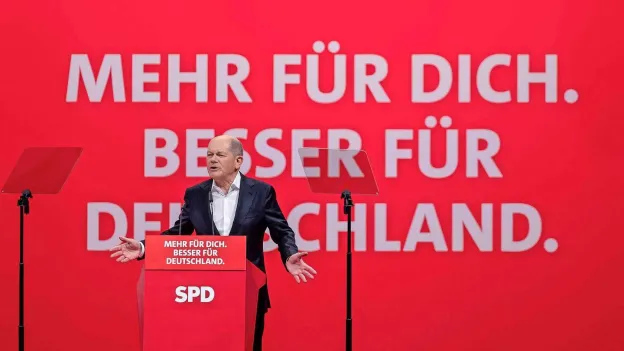
Olaf Scholz Keeping Spirits High as SPD Prepares for Federal Elections in Germany

berlin - Despite the strong expectations of right-wing parties in Germany, Olaf Scholz of the left-wing SPD is determined to maintain morale as they gear up for the upcoming federal elections.
Olaf Scholz, the current Chancellor of Germany, remains optimistic about the chances of his Social Democratic Party (SPD) in the upcoming Federal elections. Despite the recent breakup of his government at the end of November, Scholz believes that he can once again gather the most votes by the end of February. Over the weekend, the SPD held its party congress, finalized programs, and selected its candidates. "We want to come from behind just like last time," Scholz stated. "Back then, we were also lagging in the polls."
As the first election posters have been put up, Scholz is seen smiling at the voters against the backdrop of a German flag. This weekend, it was revealed that he is blocking new weapons for Kiev's defense while also challenging President Donald Trump's imperialistic plans. Both topics are popular among pacifist and anti-American voters.
The conservative opposition party CDU had already promised tax cuts that would benefit the wealthy the most. Scholz plans to take a different approach. "The top 1 percent earners will pay a bit more, and the remaining 95 percent of workers and self-employed individuals will be relieved," he said. Scholz aims to prevent pension cuts and increases in health insurance costs.
However, the outgoing Chancellor is facing economic headwinds. Other parties are capitalizing on this, such as newcomer Sahra Wagenknecht with her BSW party. "Since 2019, our economy has not grown. Our country is threatened by deindustrialization," she stated at the BSW congress in Bonn.
Germany has been plagued by the pandemic, inflation, the Russian war against Ukraine, and the high costs of migration over the past four years. This has resulted in a significant budget deficit for 2025, leading the liberal Finance Minister Christian Lindner of the FDP to recently pull the plug on the coalition.
Despite the challenges, the conservative CDU leads the polls with over 30% of the vote. The party of Angela Merkel's successor Friedrich Merz is adamant about not working with the far-right opposition party AfD, which polls around 20% and is supported by tech billionaire Elon Musk, a Trump advisor. Merz aims to formulate a "common European strategy" regarding Trump instead of "staring at the snake like a rabbit".
The AfD gathered in Saxony's Riesa, where Alice Weidel was appointed as the lead candidate. The party introduced a resolution requiring a family to consist solely of a father, mother, and children. Interestingly, Weidel herself lives with a lesbian partner and has two children. The party also advocates for forced repatriation, dismantling wind turbines, and the dismissal of certain professors. The latter two points drew criticism from energy companies and universities.
Thousands of Germans protested outside the congress venue in Riesa against the AfD, leading to local police intervention to restore order.


Leave a comment